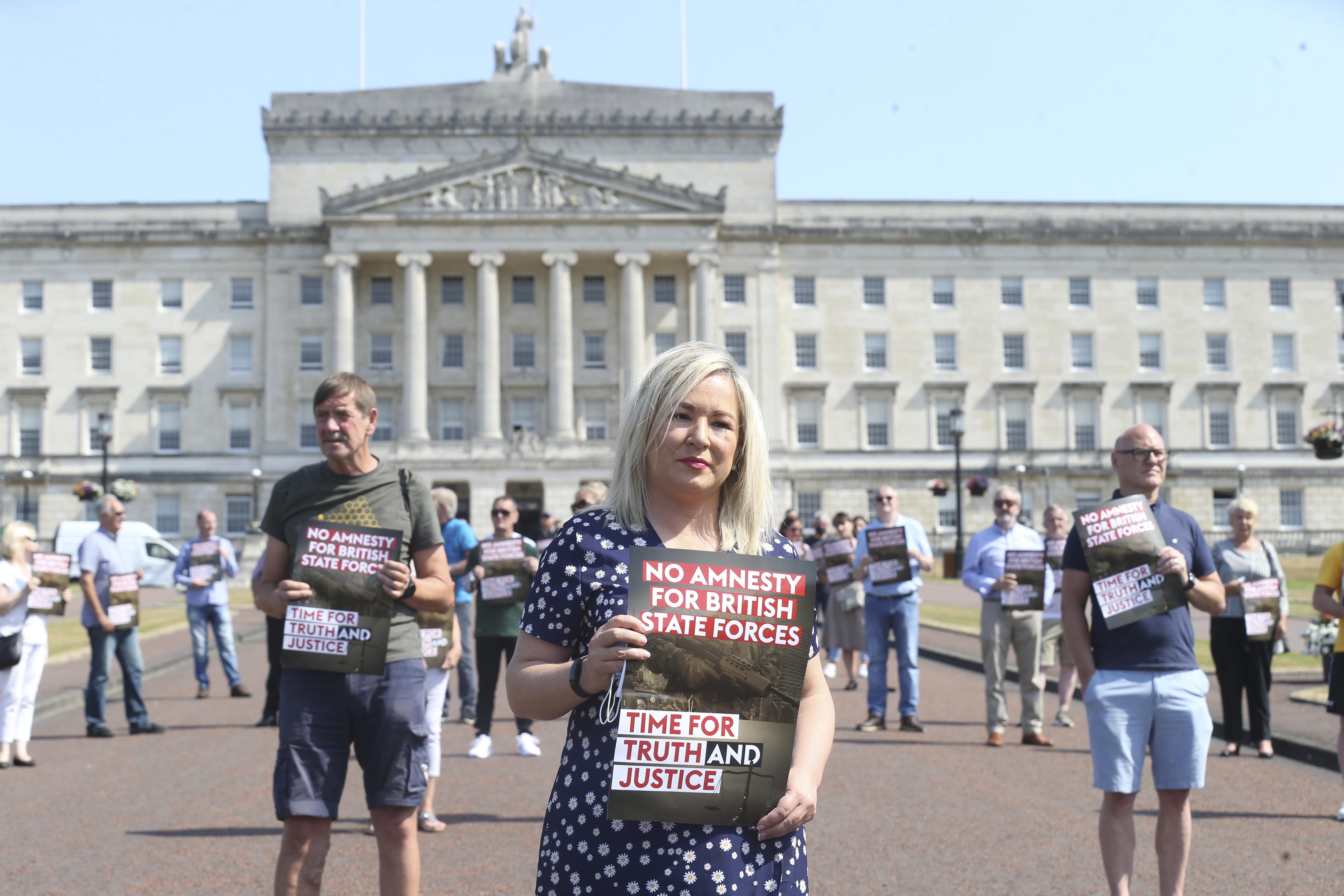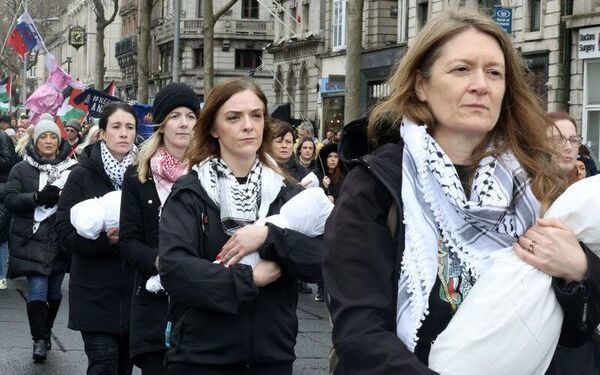ONE after another their faces appeared on my Twitter feed. The very young. The older. Children and young people. Mothers and sisters and daughters. Sons and brothers and fathers. Uncles. Aunts. Grandparents. Many with smiling faces from better times. Birthdays. Weddings. A night out. Black and white and colour images. The faces of victims – the legacy of decades of conflict.
The response from Relatives for Justice to the British government’s plan to close down legacy cases, criminal prosecutions, inquests and civil actions was simple in its design but powerful in its effectiveness.
#NeverGivingUp was the hashtag. The defiant message of solidarity and of intent to pursue truth from the families was a poignant reminder of lives lost and families bereaved. Norah McCabe; Jack Duffin; Christy Doherty; Julie Livingstone; Peter Gallagher; David McCafferty: Eileen Duffy; Jean Smyth-Campbell; Thomas McErlean; Charlie and Tess Fox; Anthony McDowell; Francis Rowntree; Sheena Campbell; the Ballymurphy Massacre families; the Springhill Massacre families; the Bloody Sunday families, and many, many more.
JUSTICE SEARCH: A new mural commemorating Danny Barrett in Ardoyne.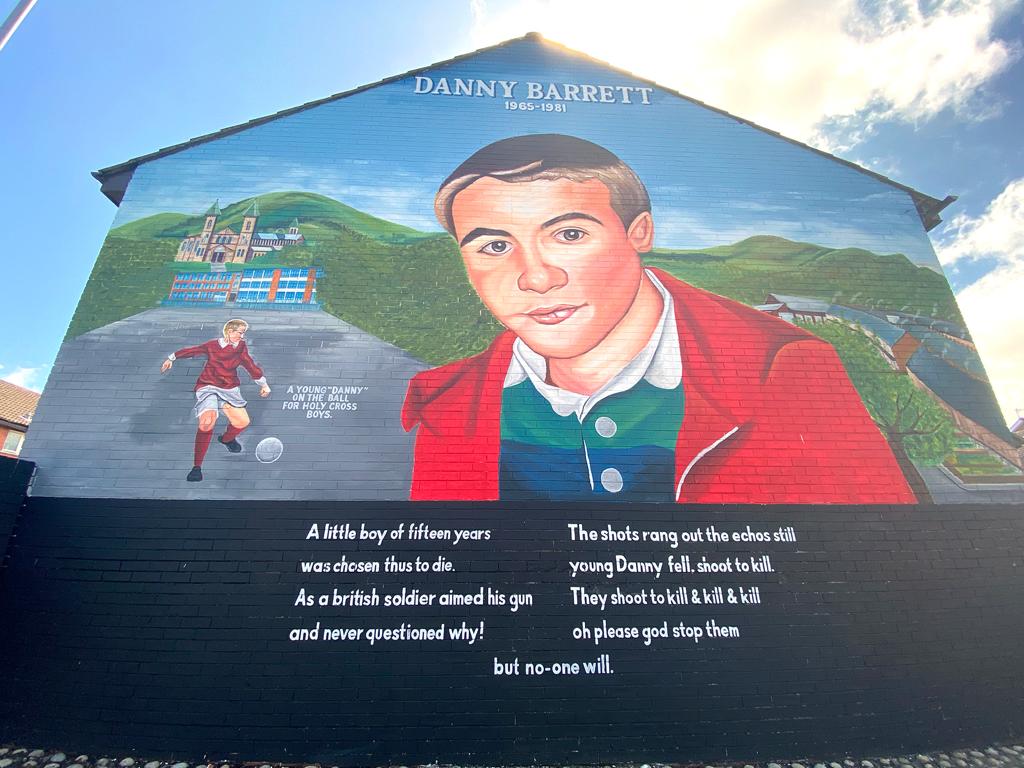
Last week the circumstances surrounding the lives and deaths of hundreds of citizens were set aside by a British Government determined to protect those who carried out and/or were complicit in these murders. The priority for Johnson and Lewis is to protect the government and its military and security agents: the British Army; the RUC; the Military Reaction Force (MRF); Force Reconnaissance Unit (FRU); Britain’s intelligence agencies; the civil service mandarins who devised and implemented the collusion and shoot-to-kill policies and defended murder; and the British political leadership who had overall responsibility for all of this.
Successive British governments without exception have connived in this. From the very commencement of Operation Banner – the British Army’s name for its decades long military occupation in the North – legal and judicial measures were out in place to minimise British forces being held accountable for their actions.
#nevergivingup ❤NEVER pic.twitter.com/jpPCL5rnGT
— Teresa Campbell (@mctasneyteresa1) July 22, 2021
The British state knew exactly what it planned to do. Brigadier General Kitson spelt it out in 1969, the year before he arrived in Belfast to take command of the British Army units in the city. “Everything done by a government and its agents,” he wrote, “in combatting insurgency must be legitimate. But this does not mean that the government must work within exactly the same set of laws during an emergency as existed beforehand. The law should be used as just another weapon in the government’s arsenal, in which case it becomes little more than a propaganda cover for the disposal of unwanted members of the public.”
This was Britain’s colonial policy at its most corrupt. It was the underlying ethos at the heart of its counter-insurgency strategy when the first British soldiers set foot on the streets of Derry and Belfast in August 1969. The British Army was less than two years out of Aden/Yemen where it had a deserved reputation for brutality and ruthlessness. In the previous decades it had also fought counter-insurgency wars in Kenya, Cyprus, Malaya, Oman and other places. Kitson served in most of these.
Torture, shoot-to-kill, mutilation, internment, the manipulation of the law and judiciary were all common place in those conflicts. Of course, the Brits denied any wrong doing. Accusations of human rights abuses were dismissed by London as black propaganda. It took 70 years for a British minister to apologise and for the British to agree to pay millions in compensation for its actions in Kenya where thousands were killed, mutilated and raped.
The Johnson government is following in this long colonial tradition of cover-up and lies. Its objective in unilaterally introducing new legal prohibitions on truth is to finally end any legal avenue available to victims and their families of holding the British government and its military and political personnel to account for the murders carried out on Britain’s behalf.
When the British Secretary of State Brandon Lewis stood in the British Parliament on 14 July he said: “...the unresolved legacy of the Troubles remains. It continues to impact and permeate society in Northern Ireland. The past is a constant shadow over those who directly experienced the horrors of those times. And also over those who did not, but who now live with the trauma of previous generations.”
Few could find fault with this comment, but Lewis then indulged in the most rank hypocrisy. He binned the Good Friday Agreement. He binned the St. Andrews Agreement. He binned the Eames/Bradley proposals and the Stormont House Agreement. And he binned the New Decade, New Approach agreement. He set aside all of the previous conversations on addressing legacy and outlined a legislative course of action that will reinforce all of the negative aspects of legacy he claimed his proposals would end.
Johnson and Lewis have ensured by their duplicity that the legacy issue will remain unresolved. It will continue to dominate much of the political discourse in the North. And their actions will add to the horror and trauma already experienced by victims. The universally negative response of families and political parties to the British is evidence of this.
Double standards, insincerity and hypocrisy are nothing new from British governments. 40 years ago, five days after Bobby Sands had commenced his hunger strike, Thatcher came to Belfast. Speaking at Parliament Buildings she said: “There is no such thing as political murder, political bombing or political violence. There is only criminal murder, criminal bombing and criminal violence. We will not compromise on this.” What she neglected to state was that this hypocritical view of the world only applied to everyone else. Her actions and those of her government and its security forces were exempt. They could murder and torture and employ political violence with impunity.
Johnson and Lewis know this. Their approach to legacy was decided long ago. They knew that victims and their families, some of who have campaigned with dignity for 50 years, would feel betrayed, hurt and angry. They don’t care. The feelings of families are irrelevant to the British Government. Its priority was and is protecting the British state and those who killed on its behalf. That now means shutting down due legal process in respect of legacy inquests, judicial reviews, civil cases or prosecution cases involving British soldiers already before the courts. In the course of my political life I have met with the families of victims of the British Army, the IRA, the UDA and UVF, the RUC and others. I am always amazed by their courage and determination and resolve to pursue truth and accountability. That battle in many instances has been passed on to a new generation of grandchildren and great-grandchildren. No British Act of Parliament is going to stop them. If Johnson and Lewis think that families will acquiesce to this they are wrong. If they think that drawing an imaginary line in the sand will stop the families search for truth – they are wrong. This line will be swept aside.
Climbing mountains for unity
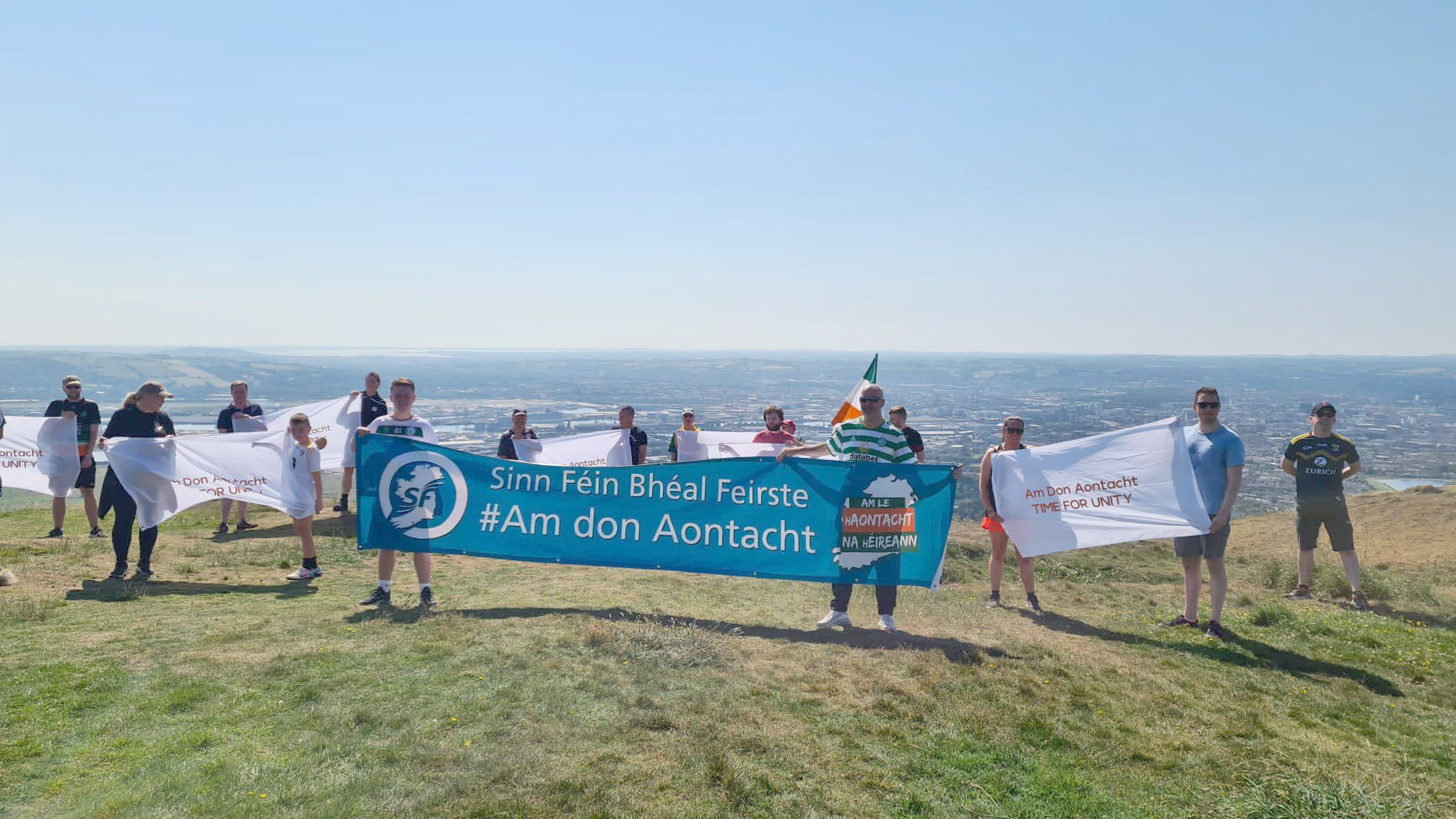
I want to commend all of those who took part in the Climb for Unity at the weekend. From North Antrim to Mount Gabriel in West Cork; from Slieve Patrick in South Down to Slieve Gullion in South Armagh; from Sugar Loaf to Bray Head; from Cnoc Chamais in Conamara to Knockavoe overlooking the River Foyle in west Tyrone; to Loughcrew and Patrickstown in Meath; from Carntogher to the Black Mountain and Cave Hill overlooking Belfast and at all parts in between hundreds of activists braved the scorching weather to climb summits and hills, small and large, with their banners and posters to promote the Irish unity cause.
The epidemic of photographs on Twitter and Facebook of gorgeous views, across breathtaking landscapes, against clear blue skies were amazing. So, well done to all. It was a great idea. Let’s do it again some time.
Cock-a-doodle-doo!
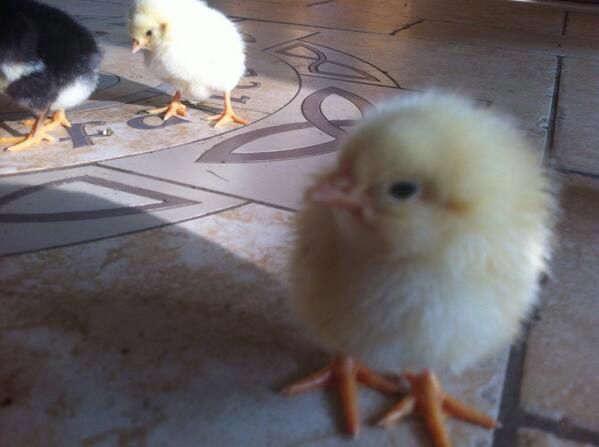
Discerning readers of this column will know I love animals. Dogs are number one. I love horses too. Cats I admire. And all manner and make of wildlife. And birds. Including farm yard ducks geese and chickens. My friends, the Dognappers, have chickens. They are called the Dognappers on account of some of our dogs being found in their custody once. The little people in my life suspect our dogs were kidnapped. I said nothing but the dogs were handed back eventually. And that’s how the Dognappers got their name.
Anyway back to the chickens. A rooster joined the chickens recently. The little people in my life named him Russell. You can see they like giving names to things.
“Russell the Rooster?” I asked.
“No, Russell Crow,” they said “Crow without the ‘e’ on account of the way he crows.”
And crow he does. From dawn to dusk. I don’t mind. In fact I quite like the sound of Russell’s crow. I also came to admire his strutting, flamboyant, macho parading about the place with his harem of hens.
Then I came on him on his own last Thursday. He bristled at me and blocked my way. Like an old time Belfast hard man – all ‘Who do you think you’re looking at?’ and a Belfast dander to suit his attitude.
But I stared him down. No little red rooster is going to face down a man fom the Murph! Then he flew at me. First he grew in size. His neck feathers expanded. So did his wings as with a kamakazi roar and claws outstretched he flew straight at my crotch. Whack!
Beak. Claws. A feathered bullet of sheer aggression struck me in the Henry Halls.
I was stunned.
“Ya wee bastard,” I cried.
Then he hit me again. In the same place. Right on target. This time I was scared too. I retreated a step or two.
He advanced. I pulled off my t-shirt and swung it like a mace. As he flew at me again I caught him in the gub with the garment. We went back and forth like that while the little people in my life cheered on Russell.
Eventually I forced him away. He flew up on a wall, puffed himself up again and defiantly crowed at me.
I caught my breath and clutched my Henry Halls. I screamed at him. He shook his tail feathers at me in derision.
“Don't you think this is the end of this,” I yelled as he strutted off.
The little people in my life were not impressed.
I’m now planning a rematch. Honour demands it. Mano et mano. Watch this space.

